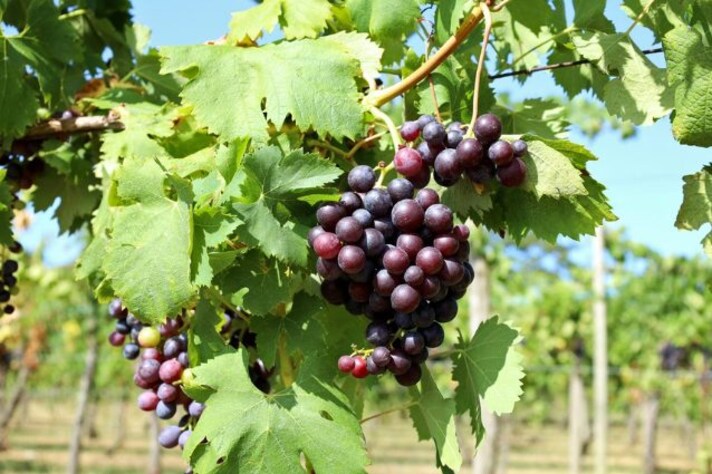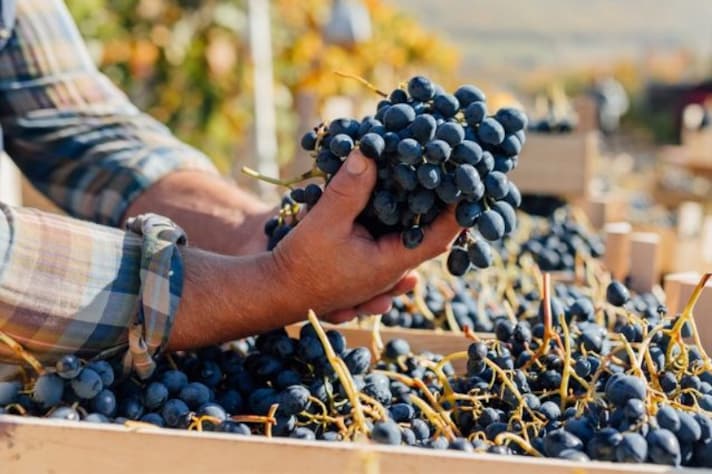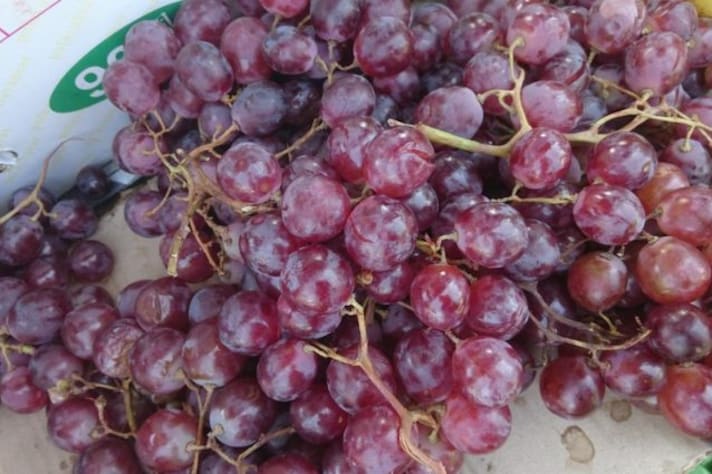What Are Strawberry Grapes, What Do They Taste Like and How Can You Use Them in The Kitchen?
A vigorous and resistant type of grape that comes from the United States, where it is forbidden to produce wine for sale, but grown in Italy and Europe as an aromatic and sweet table grape, perfect for making jams, liqueurs and rustic cakes.

The strawberry grape, also known as the American grape or Isabella (in reference to one of its most widespread dark types), is a variety with a history that we could define as fascinating: it is linked to its North American origins and its resistance to disease. Unlike Eurasian grapes that belong to the Vitis vinifera species, the strawberry grape is part of the Vitis labrusca family, a type that comes from the north-eastern areas of the United States. Characterized by a sweet pulp and medium-sized round grapes, it can be black or white and has a taste and aroma that recall the red fruit from which it takes its name.
It is a rustic grape, unsuitable for producing quality wine, which arrived from overseas to deal with the phylloxera epidemic that in the 19th century wreaked havoc on the native vines of the Old Continent: since its roots were capable of tolerating the attack of the fearsome insect, unlike the European ones that were destroyed, these were used to create hybrids that could survive and restore vigor to the entire wine-growing sector.
There was a rebirth, but at the same time over time the strawberry grape – which tolerates the cold well, is capable of growing in poor soil and is easy to grow even in the mountains – risked taking over Italian and European vines: thus, since 1931, the trade of its wine (the fragolino, which can only be produced for family use) has been prohibited, not only to protect Italian vines, but also for health reasons. During the fermentation of the must of Vitis labrusca grapes, there is a higher concentration of methanol than in those of Vitis vinifera, an alcohol that if ingested in large quantities can be harmful. For this reason, the strawberry grape itself is not toxic, indeed, it has many properties, and is included in the table grapes : sugary and crunchy, it is eaten fresh, and is perfect as an ingredient for jams, desserts, juices and spirits.

Strawberry Grapes' Properties
Strawberry grapes have a good nutritional profile. Composed mainly of water (more than 80%) , these grapes are refreshing and hydrating and contain a good amount of fiber, which is found especially in the skin of the grapes, which promote intestinal regularity and a sense of satiety. Furthermore, it is a low-calorie food, where there are approximately 69 kcal per 100 grams. On the vitamin front, strawberry grapes stand out for their supply of vitamin K, which plays a crucial role in blood clotting and in maintaining bones, and vitamin C, which we know is an important ally of the immune system. There is no lack of essential mineral salts, in particular potassium. One aspect that makes strawberry grapes interesting (especially the dark variety) is their richness in antioxidants, such as polyphenols (including anthocyanins, flavonoids that also give them their blue-purple colour ) and resveratrol: these are all substances that are useful for reducing inflammation and fighting free radicals.

The Sub-Varieties of Vitis Labrusca Grapes
What is generically called strawberry, Isabella or American grapes is actually part of a group of grapes belonging to Vitis labrusca amercana, as explained above. Although the terms are used as equivalents – "American" is the most generic – botanically there are differences between the various subgroups of grapes.
- Fraga. A variety of black grape, with slightly larger berries and slightly earlier than the strawberry.
- Strawberry. A variety of black grape, the most widespread variety of the group. It was introduced in Italy and Europe around 1825 due to phylloxera.
- White strawberry. Variety of white grape, with medium-small berries and a slightly acidic flavor.
- Early strawberry. A variety of black grape that ripens from the end of August and can be harvested until the end of September. A prized variety is found in Piedmont, in particular in Suno (NO), where a large festival is also held in its honor.
- Early white strawberry. White grape variety with sweet and intense, larger berries than the previous ones.
- Isabella. A variety of black grape characterized by low productivity and a not very intense aroma, but a very sweet flavor.
How to Grow Strawberry Grapes
Growing strawberry grapes can be very rewarding. From an aesthetic point of view, in fact, it is particularly suitable for the creation of pergolas and natural coverings in general on walls and gazebos, thanks to its dense foliage (the leaves are large and with a serrated edge, ranging from intense green in summer to yellow in autumn), and compact bunches with medium-sized, round grapes that are blue-black or light green and golden yellow in color depending on the variety. Each grape is covered with a thin pruina (a typical grape patina), which gives it a matt and velvety appearance. This type of vine, as seen, is strong and vigorous – usually between 5-6 metres in height, but can also reach 10-12 – and adapts to different types of soil and exposure: despite this, it prefers sunny places with at least 6-8 hours of direct light a day and well-drained soil, to avoid water stagnation, without the presence of limestone. The strawberry grape also has the advantage of being very productive: the early black Isabella variety is harvested as early as the beginning of August, while the ripening of the other types occurs between mid-September and the first two weeks of October.

What Are Strawberry Grapes Used for In The Kitchen?
In the USA, strawberry grapes are often used as a refreshing snack, enjoyed fresh or chilled for a burst of sweetness. They’re also popular in salads, smoothies, or fruit bowls, where their vibrant color and sweet, tangy flavor add a unique twist. In other countries, such as Japan, these grapes are sometimes used in upscale desserts or paired with cheese, capitalizing on their aromatic sweetness. In some European countries like Spain and Italy, strawberry grapes are also incorporated into fruit tarts or served with wine as part of tapas-style meals.
;Resize,width=767;)
;Resize,width=712;)

;Resize,width=712;)
